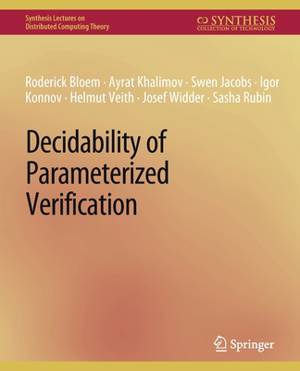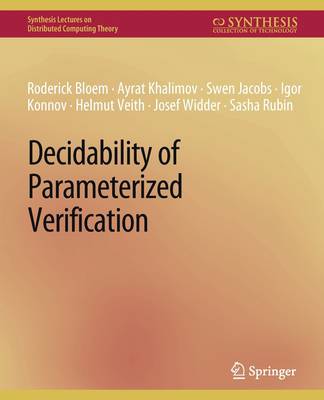
Door een staking bij bpost kan je online bestelling op dit moment iets langer onderweg zijn dan voorzien. Dringend iets nodig? Onze winkels ontvangen jou met open armen!
- Afhalen na 1 uur in een winkel met voorraad
- Gratis thuislevering in België vanaf € 30
- Ruim aanbod met 7 miljoen producten
Door een staking bij bpost kan je online bestelling op dit moment iets langer onderweg zijn dan voorzien. Dringend iets nodig? Onze winkels ontvangen jou met open armen!
- Afhalen na 1 uur in een winkel met voorraad
- Gratis thuislevering in België vanaf € 30
- Ruim aanbod met 7 miljoen producten
Zoeken
€ 47,45
+ 94 punten
Uitvoering
Omschrijving
While the classic model checking problem is to decide whether a finite system satisfies a specification, the goal of parameterized model checking is to decide, given finite systems ����(n) parameterized by n ∈ ℕ, whether, for all n ∈ ℕ, the system ����(n) satisfies a specification. In this book we consider the important case of ����(n) being a concurrent system, where the number of replicated processes depends on the parameter n but each process is independent of n. Examples are cache coherence protocols, networks of finite-state agents, and systems that solve mutual exclusion or scheduling problems. Further examples are abstractions of systems, where the processes of the original systems actually depend on the parameter. The literature in this area has studied a wealth of computational models based on a variety of synchronization and communication primitives, including token passing, broadcast, and guarded transitions. Often, different terminology is used in the literature, and results are based on implicit assumptions. In this book, we introduce a computational model that unites the central synchronization and communication primitives of many models, and unveils hidden assumptions from the literature. We survey existing decidability and undecidability results, and give a systematic view of the basic problems in this exciting research area.
Specificaties
Betrokkenen
- Auteur(s):
- Uitgeverij:
Inhoud
- Aantal bladzijden:
- 158
- Taal:
- Engels
- Reeks:
Eigenschappen
- Productcode (EAN):
- 9783031008832
- Verschijningsdatum:
- 29/09/2015
- Uitvoering:
- Paperback
- Formaat:
- Trade paperback (VS)
- Afmetingen:
- 190 mm x 235 mm
- Gewicht:
- 303 g

Alleen bij Standaard Boekhandel
+ 94 punten op je klantenkaart van Standaard Boekhandel
Beoordelingen
We publiceren alleen reviews die voldoen aan de voorwaarden voor reviews. Bekijk onze voorwaarden voor reviews.











